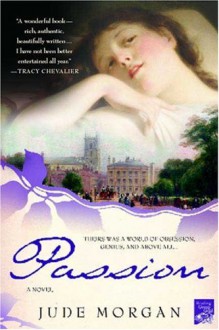
Pinterest board: http://pinterest.com/runaway84/passion-a-novel-of-the-romantic-poets-by-jude-morg/
Passion is the third book I've read by Jude Morgan. Even though I've read
Indiscretion and
Charlotte and Emily, I still was fearful over
Passion. Why? Well, because like the other two books I read,
Passion is told from the perspectives of women, and I figured that Morgan was bound to screw up sometime. I'm very hesitant to read a book primarily about women and from their point of view when it has been written by a man, but let me tell you something: Sometimes, while reading his books, I've completely forgotten who the heck wrote it, because I'm so absorbed in the story. You know, some male authors will write female characters that are completely unrealistic and clearly exist in their own fantasies, but Morgan has written nothing but realistic, flawed women, and I thank him for that.
The book is told from the perspectives of four women from the Romantic era: Augusta Leigh, half sister to Lord Byron; Lady Caroline Lamb, one-time lover to Lord Byron; Mary Goodwin, author of
Frankenstein, and eventual wife of Percy Bysshe Shelley; and Fanny Brawne, the love of John Keats' life. However, really, we see everyone from this era. Everyone. Some folks popped up and then left as fast, but some stuck around. It was like a revolving door of names: Polidori, Trewlany, Hunt, etc.
Augusta and Mary were the ones we seemed to hear the most from. We heard a bit from Caroline at the beginning, but once her affair with Byron was over, she only popped up now and again. My favorite to hear from was definitely Mary, and this wasn't the case at the beginning, but I started to realize that I enjoyed her parts more and more as the story went on.
I also enjoyed Fanny Brawne's parts, but we didn't hear much about her until the last part of the story, and unfortunately, Keats didn't show up regularly until the last one hundred pages. This is my only qualm, really, because of all the men were heard about in the story, Keats is my favorite.
It took me three weeks to read this, only because I was savoring it. I'd stop reading, and do some research about what I just read, or I'd just sit and think. I also made a Pinterest board to help me visualize the people and events I was reading about. I ended up getting a lot from this book, and it will probably influence my reading for a while. Because, you see, I haven't read a lot from the Romantic poets. Sure, when I saw
Bright Star a few years ago, I read a little of Keats' stuff, but that was it. I'm very much inspired, after reading
Passion, to dig into all the works I heard about in the book.
I guess I should say something of the writing. It was beautiful, not flowery, yet very readable. Each woman had their own distinctive voice and personality. The period was also evoked very well, and I definitely got lost in it. This book is definitely a keeper. I could see myself reading it again someday.


 Log in with Facebook
Log in with Facebook 






